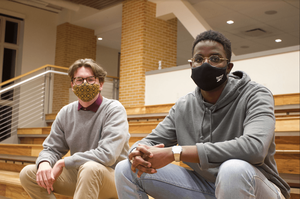 "
"
“Be bold,” declares Allan Njomo and Matthew Bisner’s campaign slogan. And the ticket’s accompanying platform — filled with detailed plans for equity, accessibility and student well-being — certainly promises a bold agenda.
The team’s ideas are both ambitious and specific: student oversight of the COVID-19 disciplinary process; improvements to the university’s mental health services; resources for marginalized student populations; comprehensive sexual education for the student body. Their full plans stretch on for about 11 pages. Some of these plans may strike voters as too bold for a one-year term. But as the most experienced ticket in the race, Njomo and Bisner hope their detailed agenda and student government know-how will help them hit the ground running.
Currently serving as Stanford Hall president, Njomo also has legislative experience from his tenure as a student senator. Bisner formerly served as president of Judicial Council, a branch of student government that oversees student government ethics and elections. And as the co-vice president of PrismND — the university’s LGBTQ+ undergraduate student association — Bisner also has his finger on the pulse of student activism.
“I feel like I do straddle that line, a bit, of insider-outsider,” Bisner said.
The two are both first-generation, low-income students, which colors their vision of community and government. They’re committed to availing marginalized students to resources and support, while also making the Notre Dame community a more inclusive place for everyone.
When COVID-19 abruptly closed campus to students last semester, Bisner worried about other low-income students who were suddenly estranged from the university’s resources. With help from other students, including some from other universities, he quickly pulled together a spreadsheet of crowdsourced resources, ranging from food to housing.
Distance learning posed a unique challenge for low-income students, but Njomo and Bisner know that financial barriers remain, even now that students are back on campus. They want to lower those barriers so low-income students can feel at ease and welcome in the campus community.
“While I receive extensive financial aid, when it comes to buying textbooks, it can be very tough,” Njomo said.
Accessibility remains a challenge not only for low-income students, the candidates said, but also for disabled students, students of color and LGBTQ+ students. Over winter break, the pair met with student clubs representing these different populations, including the Native American Student Association and Access-ABLE. Those conversations shaped their platform, and they want to continue elevating student activists if elected as student body president and VP.
Justice is a hallmark of the Njomo-Bisner ticket, and the new changes to the student disciplinary process this semester worry the candidates. With no option to appeal coronavirus-related disciplinary decisions, the team fears the process isn’t just. That’s why they’re proposing a student oversight committee that will review all expulsions. It might seem far-fetched, Bisner said, but the idea is modeled off similar committees at other universities.
In keeping with their promise to “be bold,” the candidates plan to challenge the university’s sex-ed status quo. Notre Dame students, they said, need access to better information about sexual health and wellbeing.
“We recruit a lot of students who come from schools with abstinence-only sex education into an ecosystem with no support for sex-ed. And that leads to harmful outcomes for students,” Bisner said. “Students are getting hurt because they don't know.”
Some sexual safety tips are available on the University Health Services website, Bisner said, but he and Njomo want to make those resources more visible — while also honoring the university’s Catholic mission and highlighting strategies like natural family planning.
The pair knows they might face pushback from administrators, students or alumni who object to their daring agenda. But in this role, Njomo said, criticism is par for the course, and they’re ready for it.
“The reality is, there’s an appetite for these things and these issues to be discussed,” Njomo said. “I think we should take steps to address student needs no matter what the consequences could be on us.”